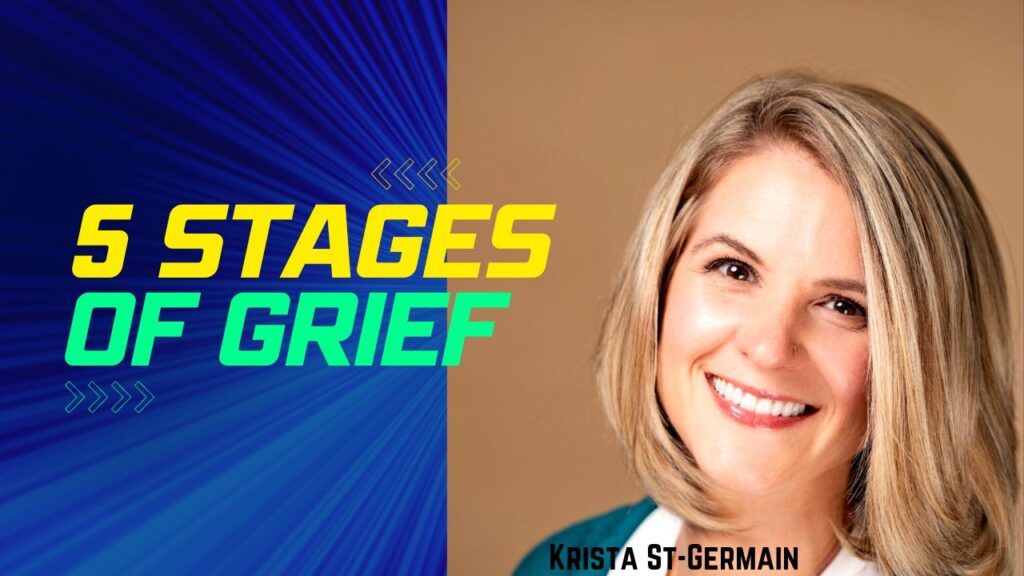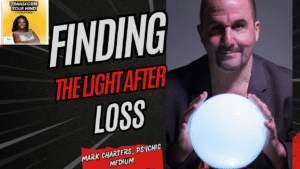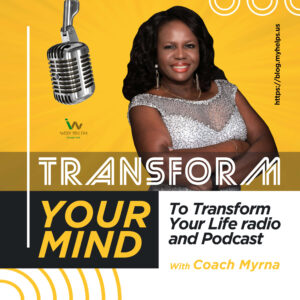Krista St-Germain watched her husband killed by a drunk driver as he was changing her flat tire at the side of the road. After she was able to uncurl herself from the fetal position, she started working on the journey of post traumatic growth and became a Master certified coach to help other widows how to deal with, grief, and debunk the myth of the, 5 stages of grief.
Download the podcast here:
Bio
Krista St-Germain is a Master Certified Life Coach, Post-Traumatic Growth and grief expert, widow, mom and host of The Widowed Mom Podcast. When her husband was killed by a drunk driver in 2016, Krista’s life was completely and unexpectedly flipped upside down. After therapy helped her uncurl from the fetal position, Krista discovered Life Coaching, Post Traumatic Growth, and learned the tools she needed to move forward and create a future she could get excited about. Now she coaches and teaches other, widows, so they can love life again, too.
Myrna: Can you share your story of your, grief, following your husband’s death.
Krista: I was 40 When my husband died, it was my second marriage. My first one did not end all that well. And my second marriage was to me proof that amazing relationships are possible that you can be treated with respect and cherished. He was a lovely man who’s French Canadian. English was his second language, and we worked together.
The day the accident happened we had been on a trip, but we had driven separately. I had a flat tire on the way back we were almost back to my home city, so I pulled over on the side of the road, and he pulled up behind me in his car. And even though we had AAA service, he just didn’t want to wait on AAA to come, he just wanted to get home.
Sponsored Ad
Get ready to throw off the shackles that are holding you back, and begin experiencing truly EXPLOSIVE GROWTH in every aspect of your life!
Join legend Mary Morrissey and her world-class team for a remarkable 3-day workshop this January – online, from the comfort of your own home – and discover the #1 secret than can make you SHINE in 2023.
DreamBuilder Live will show you how to harness the art and science of creating an abundant future in one empowering weekend. You’ll learn how to build the life of your dreams with the proven, reliable, and repeatable 3-step Dream Building program.
Now is the time to BANISH your feelings of fear, doubt, worry, and insecurity… and replace them with the clarity, confidence, and prosperous mindset you need. Whether it’s love… money… or career dreams you’re after, DreamBuilder Live will help you achieve your full potential.
You only get ONE chance to live the life you DESERVE. So don’t delay.
Go to BTI.com/transform and register for your FREE tickets (with a reimbursable deposit) today!

My grief was caused by a drunk driver
So, I’m standing on the side of the road texting my daughter who was 12 at the time to tell her that we would be a little bit late. And he’s digging in my trunk, essentially his car’s parked behind my car. He’s trying to get access to the spare tire, and its daylight 5.30 pm on a Sunday and a driver who we later found out had meth and alcohol in his system, did not see our hazard lights and just crashed into the back of Hugo’s car and trapped him in between his car and my car. And you know within 24 hours he was gone.
So, I went from having this amazing marriage and life to thinking that I would probably never be that happy again. And that I should just be grateful for what I had, because if it wasn’t going to be what it once was. First, I made a call to my therapist and I still had a therapist who had been very supportive and helpful to me when I had gotten my divorce. So I went back to her and I spent those early weeks of, grief, just letting myself feel the pain. And it really helped to be able to talk about my, grief, with her.
There are, 5 stages of grief, and in the first stage, the brain goes through which I didn’t know at the time, but I understand now. The brain literally encodes “WE” so when you’re in a significant relationship, the brain makes a move from I to “WE” and so it has to then make that rewire itself essentially over time and move back from “We” to I. But while you’re in this weird place in your brain, you don’t feel exactly the same. Sometimes you kind of question yourself because you know intellectually that they died.
You still expect that they didn’t. One of the, five stages of grief, is denial. So, the garage door goes up and you still expect they will come in the door. You reach over in the middle of the night and you still expect that they will be there. Something happens and you pick up your phone and you attempt to text them. And so therapy was just really helpful to be able to talk that through with someone and say it as many times as I needed to say it and just let my brain adjust to the actual fact that he really had died and this really wasn’t a bad dream that I was going to wake up from.
Sponsored Ad
Proper tax preparation is pivotal in helping you make the most of your future.
For over 15 years, Patty’s Notary and Tax has been offering tax services to small businesses and individuals. Our expertise lies in helping clients prepare for various taxes, such as:
- Individual tax returns
- Estate & Trust Tax that helps heirs significantly minimize the expenses relating to obtaining their inheritance.
- Sales Tax returns because All businesses have sales tax obligations to state and local tax authorities. Our professionals can help clients understand the sales tax collection process.
To Schedule your consultation head over to https://www.pattysnotaryandtax.com/
Call us at 800-291-2560|
Or email us at Taxinfo@pattysnotaryandtax.com

Hitting a grief plateau in the 5 stages of grief
After I went back to work, I kind of reached the place where a few months in I felt stagnant. Therapists was telling me I was doing a great job. This is what I now call it, grief plateau. I didn’t have a word for it then. But that’s where all of my clients get stuck. In this place where everyone else has gone back to normal living. You look like you’re fine because you’re handling the day-to-day tasks of life. You look like you’re doing okay. And so, everyone’s telling you that you’re strong because they think you are and that you’re doing so great because it looks like you are but then on the inside you don’t feel great on the inside.
Life is this kind of empty and maybe hollow and maybe robotic and it’s just you go through the motions but there’s not a lot of joy inside. And that’s kind of where I found myself. And thankfully at that moment in time. We could call it a few things right, but it was divine timing in my opinion. That right when I really needed it and was ready for it. A coaching program came to me and it was a brand-new coaching program from a coach I had followed for a long time. It was not, grief, related, but I had listened to her podcast and I trusted her. And what she taught really resonated with me. And so I decided to go ahead and take the leap of faith and do her program.
Even though it wasn’t, grief, related, it was the tools and the things that she taught me about how to how to deal with my, emotions. And how to think about about my future. It took me from a place where I really did believe that my best days were behind me to the possibility that I could believe my best days were in front of me if I wanted and it was just really powerful.
And so, I decided, as do many people when you lose something or someone important to you, you kind of start doing an inventory on how you’re living your life. One of the, 5 stages of grief, is bargaining so, you start asking yourself, am I am I living the way that I want to live? And the answer for me was no. I didn’t I love the people that I worked with, I didn’t love my job, we built planes. I was never inspired.
Sponsored Ad
This podcast is sponsored by Journy: Plan Life & Self care App. Journy is a personal growth organizer/planner that lets you save goals, personalized notes on categories of learning and improvement, easily watch educational content across a spectrum of categories to bolster your knowledge on a deeper level.
There are also routines in the app to help with planning and organizing.
Journy was developed by a US military veteran who wanted to help people struggling with PTSD regain a sense of control over their lives, but it can be used by anyone for personal growth, self-care and mental health. The App helps everyone maintain a sense of control, through organization, personal development, and self-care.
Download Journy: Plan Life & Self-Care App on Apple or Google Play Store or visit www.journyapps.com
A portion of your monthly or annual subscription will be donated to refugees in need as well as providing scholarships to send kids and teens to Space Camp.

The grief journey is long that is why the 5 stages of grief is a myth
Myrna: I understand the, grief, journey is long. My daughter will call me up and say, Mom, and it’s not getting any better and the days are still long and I can’t wait to get through them.
Krista: Yeah, I remember that so well, too. And I see it so often in the women that I coach. It’s almost that when the world is the quietest, like evenings or weekends, it’s when you sit down and you stop working. That tends to be the moments that we dread the most because that’s when our brain starts to offer us some really challenging thoughts.
That’s when my brain would offer me you know, you should probably just be grateful because it’s really never it’s never going to be that good again. Or, no one’s really ever gonna love you like he did. No one’s going to accept your shadows and all of your humaneness like he did.
I think there is opportunity there, to open ourselves up to what’s really happening in that moment. The, stages of grief, are all emotions and we were never taught how to deal with feelings and emotions. Nobody ever said, emotions, aren’t problems for you to solve. They’re just experiences for you to allow. What I was taught was you know, if you’re gonna cry, should probably go to your bedroom, you should probably do that alone. So in the, 5 stages of grief, you are supposed to get to, acceptance, but that is a myth.
Sponsored Ad
This episode is sponsored by Living the Tao: Spiritual Podcast
Do you want to embrace the wonder of the Tao? Journey inward to journey outward? As he has done for decades, Taoist Master Mikel Steenrod talks about the path of spiritual freedom and down-to-Earth, everyday living well in this podcast series.
Most podcasts are from people that are fans of Taoism, and appreciate the Taoist classic, Tao Te Ching, which is one small part of Taoism. This podcast is from a Taoist Master that has been talking about the daily practice and exciting ideas of Taoism for over twenty years, and is just now taking advantage of podcast technology.
Hear ideas about nature of the world, and of the human condition that can radically transform your daily life into a rewarding experience.
Living the Tao: Spiritual Podcast is available for free on Audible, Spotify or Apple or by visiting thetaoismforthemodernworld.com and clicking podcast. Listen now!
: https://www.the-taoism-for-modern-world.com/living-the-tao-spiritual-podcast/

5 stages of grief: Anger
One of the, 5 stages of grief, is anger. But we were taught that if you’re angry, that means that something bad, you’re an angry person and we and maybe that means you shouldn’t be angry. And so I very much thought of, emotions, as problems to solve. I have learned that it is that philosophy that that makes those moments so awful. Feeling the, emotions, of, grief, makes us want to get out of our current experience and turn to something for comfort. It makes us want to turn to food or it makes us want to turn to alcohol or to shopping or to any distraction such as social media scrolling, it just really makes us want to get away.
Because we don’t have any other, coping mechanism, it really starts to kind of shrink what’s possible for us emotionally. So, we might be able to escape that intense loneliness with whatever the behavior is that we’re choosing, but then conversely, limit what’s possible for us in terms of taking advantage of new opportunities and figuring out what we want to think about ourselves or where we want to go next. So, we end up in this very kind of stagnant place. I call it the, emotional stagnation, zone where we’ve we’re numbing out a little bit.
Myrna: Do you teach your clients to just sit and feel there, grief? Because a lot of coaches and luminaries such as Sadhguru and all these luminaries, teach that you’ve got to feel the uncomfortable emotions. Don’t try to do to try to get rid of them. Just sit with them and let them move through you. So sitting with the, anger, is good.
Sponsored Ad
Do you feel overwhelmed with an invincible feeling of sadness?
At Meditative bliss, we will help you overcome the inexplicable stress you get from the boring routine chores and attain the solace and inner peace your soul has been yearning for.
This innovative medium will be a source of the most peaceful and relaxing free music.
Get ready to experience a euphoric treat for your spirit at meditativebless.hearnow.com
Visit us on YouTube and Spotify anytime.
Meditative bliss, serene your soul!
https://meditativebliss.hearnow.com/
Facebook – https://www.facebook.com/meditativebliss777
2. Instagram – https://www.instagram.com/meditativebliss777/
3. Twitter – https://twitter.com/BlissMeditative

Using the NOW Acronym to handle grief
Krista: I do teach them to sit with their, emotions. I use an acronym called NOW, which I find is very easy to remember.
- N – and it simply stands for name. So, you’ve just named the, emotions, in the, 5 stages of grief. So this is, anger, this is loneliness, this is denial etc.
- O – stands for Open which means open up to it, which is completely the opposite of what you will want to do. Right? But breathe it in, open your shoulders, open your chest, give it permission to be with you, and then witness your feelings of, grief.
- W – Is to witness. Become aware, witness just means watch what’s happening in your body. How are the emotions of, grief, showing up in your body. Where in your body do you notice it? Is it in your throat? Is it in your chest? Is it in your abdomen? Where is it and what is it like? Is it fast? Is it slow? Does it have a texture? Does it have a color, does it have a shape? Does it take up a little amount of space? Or is it a large amount of space? You know what actually is it and then by observing it, we get our mind off of the thoughts that created it in the first place.
Then it just flows through and once you get good at it, what I found is that it really only takes a couple of minutes for an, emotion, to flow through and so I teach it that way. And then also I don’t know about you, I love, Emotional Freedom Technique tapping. So, I teach my clients about that too. I have found great value in that over my lifetime and it helps move, widows, through the, 5 stages of grief.

Tapping gives us relief from the painful emotions of grief
Myrna: I just got introduced to, EFT tapping. Do you tap on the head?
Krista: Tapping, it’s a very flexible tool. So sometimes you can get great relief simply by, tapping, on the side of your hand, which some people will call the, karate chop point, and then also on the collarbone those are the points that if I am just looking for immediate relief, from my, grief, emotions, that I tap.
If I’m in a public situation where I don’t really want it to be all that noticeable, I’ll tap on those spots, but if you’re going through the full, tapping, regime, they’re the, karate chop point, and then eight other points make up what they call the basic recipe. And so, but it’s just it’s kind of like an off switch to you’re your, stress response, so your cortisol drops. You can breathe a little bit deeper, but I do see it as a huge opportunity.
Myrna; I haven’t had anyone in the show talking about, tapping, but I’ve read a lot of books and a lot of therapist’s touch on it. And recently, I was going through a meditative process. And one of the things that I was told is tap on your collarbone and also tap on the top of your head to certain parts of your head.
All right now you one of the things that you teach is that you said that the, Stages of Grief, are a myth. And I think one of the stages we were probably talking about what are the stages there when you said you’re in a kind of dead zone. Can you talk about the traditional, 5 stages of grief. Then we can talk about the myths. I know one of the, 5 stages of grief, is anger; one of them is denial.
The myth of the 5 stages of Grief
Krista: Yeah, first of all, I think it’s interesting when I asked this question, if I asked people how, you know how many of you knew about the, five stages of grief, or had heard of the, five stages of grief? Most people raise their hands. And then if I ask what other, grief theories, have you heard of? I usually don’t get much people don’t they’ve never heard of anything besides the, five stages of grief. And so, I think it’s just important for us to know that as with any field of study, there are multiple theories.
The, five stages of grief, is just one of the older ones and one that seems to have caught on in terms of our popular culture. So, there are many other ways of looking at, grief, besides the five stages. And I also have a lot of respect for Dr. Elisabeth Kubler Ross, who, pioneered that work in her time. She made conversations about, grief, happen at a time when they really weren’t happening. But her approach was never really intended to be it. She never really intended anyone to take her work and make it as literal as people made it right.
So, what she was doing was studying initially hospice patients. She was studying people who were coming to terms with their own mortality. She was not studying people who had lost someone.
The Five stages of grief:
- denial,
- anger
- bargaining,
- depression,
- acceptance,
Those were the, five stages of grief, that she saw happening with death and dying and then on, grief, and grieving along with David Kessler, and that work was taken and misinterpreted. So really, I think, if she were here today what she would be more likely to say is something along the lines of these are things you might experience, but you don’t need to experience them in any particular order. You are not trying to get to an end point; grief, doesn’t end.
She was not trying to say that we should all be shooting for, acceptance of grief, and then whenever we reach the point of, acceptance, that somehow that’s a fixed and finite place. She wasn’t saying that, that’s what people have heard. And that’s the boxes that they tried to put themselves in as well that they will come to me and they will say things like well, am I angry enough? Or I’m not sure that I ever felt angry. It’s not a problem. Did I do something wrong? Am I doing, grief, wrong? Because I never really felt angry. And instead of taking it as, as a starting point, a way of normalizing what could happen we’ve turned it into something prescriptive, which was never how I think that work was intended.

5 stages of grief: Denial
Myrna: You mentioned that you would be in bed and you’re be looking over for your husband and when you heard the garage door open you would hope it was him. Isn’t that, denial? Some people do get angry thinking what why did this happen? A lot of people get angry at God because they’re thinking why would God do this to me? So, I’m thinking that, even though the, stages of grief, is not prescriptive, it’s understanding that if you feel these, emotions, then there’s nothing wrong with you because it’s natural.
I would think that we always have to get to a place of, acceptance. I talked to you about my daughter when she went through, grief, because her fiancé, the man that she loved, committed suicide and she had some guilt there. Because they had a fight before he committed suicide so, she felt that she was responsible. But now she’s happily married. So, at some point in time, she had to get through the, five stages of grief. I don’t know if she was ever angry, but guessing she got to, acceptance.
Krista: I think anytime we can tell people that what they’re experiencing is an abnormal that is not in service. And so, I’m imagining that it was rather freeing for people to hear that it was okay to be angry, but that didn’t mean there was anything wrong with them if they were angry, right. So, I do think that is helpful.
And I do think it’s also helpful to offer someone what might be available to them when they feel or think in ways that create, acceptance. But I think we want to be careful of saying that when we get to, acceptance, grief ends. And that’s, that’s my issue with, acceptance. We might accept something. But that doesn’t mean that because we have accepted it, we are now somehow freed of it.

What is the goal of grief?
The goal of, grief, is not to get through it. The goal of, grief, is to integrate. Right? Because we can’t undo the loss. We’re not capable of time travel. So, we’re always going to have thoughts and feelings about the loss. And so, we never get to the end of, grief, or we don’t move on from, grief. We move forward with, grief, and we integrate that part of our life experience into the rest of our life, right? It becomes something that we now see the world through. So, what I want to help people do is just to do that with intention.
I try to help people with is to, to open them up to the idea that everything they have, everything they need is already has been given to them and is within them. Right? And that they really their happiness comes from within. And so, if they can find that truth in themselves and realize that they really are, you know, fully intact and valuable and worthy and wonderful and they don’t need anything outside of them, then if they do choose to be in a partner relationship that experience can become about giving. Right about being filled with love, and then finding someone who you want to give that love to, as opposed to what they often feel, which is the opposite is that they have a hole and they’re trying to find someone to fill it
Myrna; So that’s amazing. So yeah, so the cure is the same cure for everything. I love it. All right, so now, tell us about the Widowed Mom’s podcast and talk to us about your coaching program for helping widows.
Conclusion
Krista: If you have you have people listening who are podcast listeners. If they want to learn about, grief, I very much invite them to listen to the Widowed Mom podcast. It’s pretty specific, but I get a lot of feedback that it’s very helpful for people who are just curious about, grief, and curious about post traumatic growth and maybe want to support someone that they love who’s experiencing, grief.
And then the program that I run is highly niche right. I specifically work with, widowed moms, moms of all ages. Some of my moms have grandchildren, right? It’s not just widows with very young children, but women who identify as moms, and I help them figure out how to get through that, grief plateau, and get to a place where they really do love life again. I do that and in a six-month program.
They can find it at www.coachingwithkrista.com. Also, if anybody needs help, figuring out what episodes of the podcast would be helpful. I have a podcast quiz that I think is really good to take. and it’s at coachingwithKrista.com/grief support, and it’s a free quiz. and if you take the quiz, it will point you towards the most useful episodes for you based on what you might be struggling with.
Additional Resources









